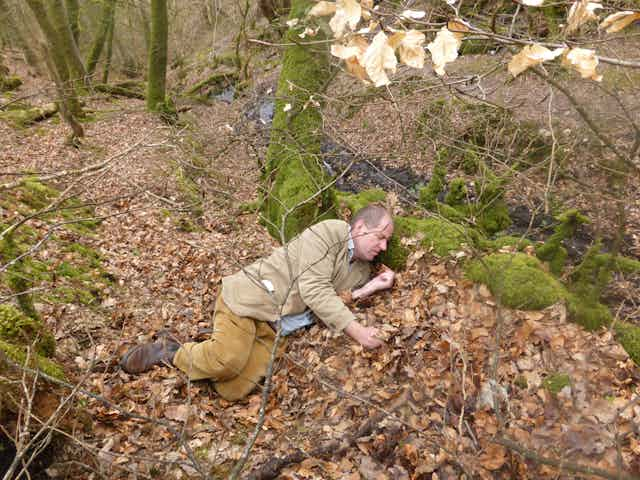I have lived as a badger in a hole in a Welsh wood, as an otter in the rivers of Exmoor, an urban fox rummaging through the dustbins of London’s East End, a red deer in the West Highlands of Scotland and on Exmoor, and, most hubristically, a swift, oscillating between Oxford and West Africa. For this I was recently awarded an Ig Nobel Prize for “achievements that make people laugh, and then think”. Why I did this is not an unreasonable question. There are many answers. One is that I wanted to perceive landscapes more accurately.
We have at least five senses. By and large we use only one of them – vision. That’s a shame. We’re missing out on 80% of the available information about the world. I suspect it’s responsible for lots of our uncertainty about the sort of creatures we are, our personal crises, and the frankly psychopathic way in which most of us treat the natural world. If we only perceive 20% of something, we’re unlikely to be able to relate appropriately to it.
In fact, it’s rather worse than this. Vision – the sense by which we’re tyrannised – is intimately related to cognition. Listen to how we speak. “Seeing is believing,” we tell ourselves. If we understand someone, we’ll say, “I see”. This is a consequence of our evolutionary history. We grew up as a species on the plains of East Africa. When we hoisted ourselves for the first time onto our hind legs, some glorious and disastrous things happened.
Most of our senses are embedded in our heads. Those heads were now a long way from the ground. We suddenly lost the perspective that we’d shared with all our evolutionary forebears. We lost our relationship with them and our relationship with the ground. Neither we nor the natural world has ever recovered. The best of us feel bereavement and alienation. Most of us feel colonially superior, and strut around looking literally and metaphorically down on what we were and the place from which we came.
Our new bipedal perspective was useful – as disastrous things so often are. It gave us big vistas. We could see how things that had been hidden in the long grass were connected. In some ways, by seeing the patterns made by the wildebeest as they wandered, we understood the lives of the wildebeest better than they understood themselves. It wasn’t surprising that we crowned ourselves king of creation.
We don’t know whether bipedalism generated our magnificent cognitive software, or whether the software was there waiting to exploit the bipedal information revolution. But there’s no doubt that cognition and bipedalism went well together. Bipedalism meant a shift to visual processing. Our cognition and our vision were partners for a while, and then cognition became the senior partner. We’re now dismally unsensual creatures. Not only do we not smell, touch, hear or taste. We barely see.

When I walk into a wood I see a tree only for a millisecond. The visual information about the tree that surges in through my eyes is almost immediately translated into abstract code. When I try to describe the tree I’m describing not the tree at all, but my thoughts about the tree. That’s bad news. My thoughts about the tree are hugely less beautiful and exciting than the tree, and have only a tenuous relationship with it. We see neither the wood nor the trees.
And part of the personal crisis is that most of my thoughts about the wood are thoughts about my own thoughts. I am achingly self-referential. When I think I’m relating meaningfully to the natural world, it’s probably onanism.
Marinating in sensation
In crawling through the wood, swimming in the rivers, mooching round Bethnal Green at night, shivering on the moorland and mapping the archipelago of air currents at the top of trees, I was trying to triumph over my cognitive biases. Trying to escape the tyranny of the visual and the cognitive. Trying to let my nose and ears and tongue and palms have a say in my brain’s reconstruction of the world. Trying to use some of the overlooked 80% of data. Trying to marinate myself in sensation, rather than being dabbed pathetically by it.
I didn’t do very well. But it was well worth a try. It’s work in progress. Have a go. It’s rather embarrassing, so wait until you’re next in a quiet wood. Drop onto all fours. Sniff the ground, lick a leaf, let your highly sensitive fingers play over the earth. See if you can hear a bird over the cognitive tinnitus that will be hissing in your head.
It would be presumptuous to say what you’ll discover. There are great mysteries out there. Have an explanation prepared for when an officious dog-walker threatens to call a psychiatrist, but remember to comfort yourself with the smug, true thought that you know the wood a little better than the psychiatrist or the walker. And possibly even than the dog. For cognition can be the cure of the diseases it creates. That is my only justification for writing, in words, a book about the things I say are beyond words.

